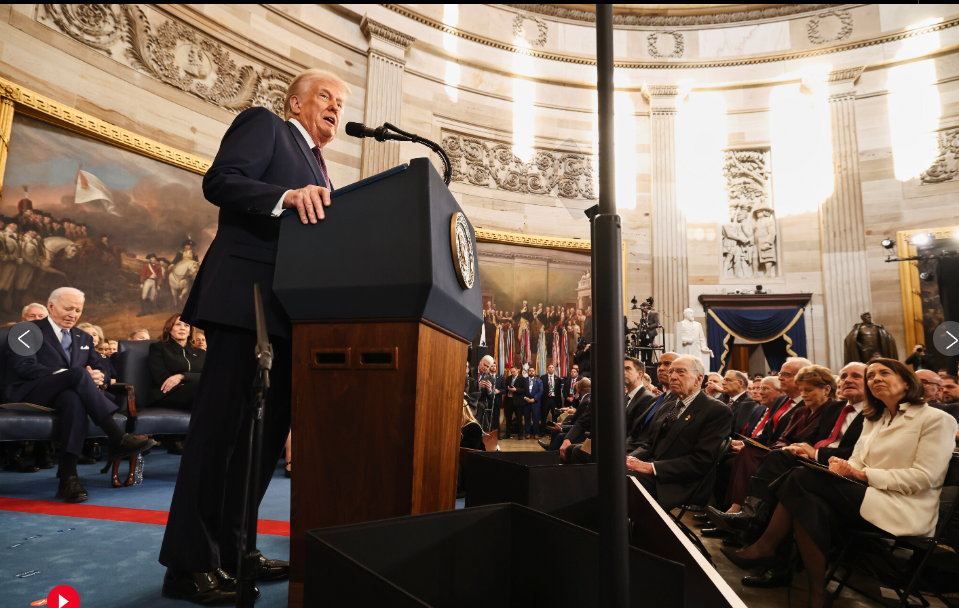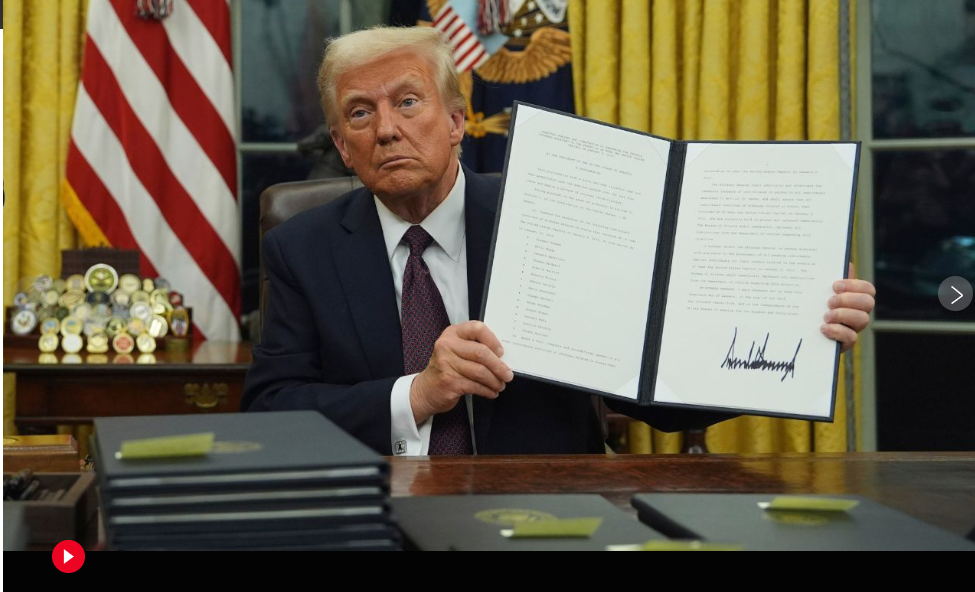The Political Significance of Donald Trump’s 2025 Inauguration


Donald Trump’s inauguration on January 20, 2025, as the 47th President of the United States marked a pivotal moment in American politics. This event not only symbolized Trump’s return to power but also introduced policies and actions with far-reaching implications, both domestically and internationally. This essay explores the political significance of the event, analyzing the shifts it triggered in governance, policy direction, and global relations.
A Return to Power
Trump’s re-election and subsequent inauguration underscored a resurgence of his influence on American politics. It also highlighted a deeply polarized electorate, with his victory representing both a reclamation of power and a validation of the “Make America Great Again” movement. His return was bolstered by a strong base of supporters who believed in his promises of border security, economic revitalization, and a rollback of progressive policies.
On his first day in office, Trump signed 26 executive orders, a historic number that demonstrated his intent to act swiftly. Among these were directives to rescind 78 orders from the previous administration. These actions focused on key campaign promises such as strengthening border security, boosting domestic energy production, and ending birthright citizenship. These moves were viewed as emblematic of his leadership style: decisive, controversial, and aimed at solidifying his political agenda.
Consolidation of Authority
One of the most significant aspects of Trump’s 2025 inauguration was the consolidation of executive power. His administration moved rapidly to confirm cabinet nominees, some of whom faced criticism for being underqualified or holding extreme views. This rapid action revealed a strategy to minimize opposition and streamline governance, albeit at the cost of traditional checks and balances.
Critics argued that this approach posed risks to democratic norms. For instance, the swift confirmation of controversial figures raised concerns about the erosion of institutional safeguards. Political analysts suggested that such actions could undermine the effectiveness of governance and set precedents for future administrations.
Impact on Domestic Policies
Domestically, Trump’s policies reflected a significant departure from the progressive initiatives of his predecessor. His administration prioritized issues such as immigration, energy independence, and economic reform. One of the most notable executive orders involved the strengthening of border security, which included plans to expand the border wall and deploy additional resources to deter illegal immigration.
Another key area of focus was energy production. Trump’s policies aimed to reduce regulations on fossil fuel industries, arguing that this would boost job creation and energy independence. However, these moves faced criticism from environmental groups, who warned of potential long-term consequences for climate change.
The administration’s decision to end birthright citizenship sparked intense legal debates and protests. Critics argued that such a move contradicted constitutional principles and human rights, while supporters viewed it as a necessary step to curb illegal immigration. These actions highlighted the administration’s commitment to fulfilling campaign promises, despite the controversies they sparked.
International Repercussions
Internationally, Trump’s inauguration was met with varied reactions. Far-right groups around the world celebrated his return, viewing it as a validation of their ideologies. Leaders from countries such as France, Brazil, and the United Kingdom expressed support for Trump’s hardline policies, signaling a potential shift in global alliances.
Trump’s foreign policy agenda focused on “putting America first,” which included renegotiating trade deals and reducing the country’s involvement in international conflicts. While these policies resonated with his supporters, they also raised concerns among allies about the future of multilateral cooperation.
For instance, Trump’s stance on global trade issues created tensions with key trading partners. His emphasis on renegotiating trade agreements was seen as a move to protect American industries, but critics argued that it could lead to economic isolation. Similarly, his decision to reduce funding for international organizations sparked debates about America’s role in global governance.
Challenges Ahead
Despite the bold initiatives outlined during his inauguration, Trump’s administration faced significant challenges in translating these actions into effective governance. Promises such as resolving global trade issues and lowering grocery prices were met with skepticism due to their complexity and the lack of detailed plans.
Domestically, policies like mass deportations and tax cuts for the wealthy faced strong opposition. Critics argued that these measures could exacerbate social inequalities and strain public resources. Additionally, the administration’s handling of legal challenges to its executive orders tested its ability to navigate the complexities of governance.
Internationally, Trump’s approach to diplomacy was both a strength and a weakness. While his direct style resonated with supporters, it also alienated some allies and created uncertainties about America’s commitments on the global stage. Balancing domestic priorities with international responsibilities emerged as a key challenge for the administration.
Conclusion
Donald Trump’s 2025 inauguration marked a transformative period in American politics. It symbolized a consolidation of executive power, significant policy shifts, and a redefined role on the global stage. The political significance of this event lies in its potential to reshape domestic and international landscapes, challenging existing norms and prompting critical discussions about the future direction of the United States.
For more insights and analyses on political events, visit EssaySharp.
References
New York Post. (2025, January 22). Republicans praise Trump’s barrage of executive orders – and demand Congress codify them. Retrieved from https://nypost.com/2025/01/22/us-news/republicans-praise-trumps-barrage-of-executive-orders-and-demand-congress-codify-them/
The Atlantic. (2025, January 23). Trump’s Second Term Might Have Already Peaked. Retrieved from https://www.theatlantic.com/politics/archive/2025/01/trump-inauguration-executive-orders/681403/
Wired. (2025, January 23). The Global Far Right Is Celebrating Trump’s New World Order. Retrieved from https://www.wired.com/story/global-far-right-celebrating-trump
